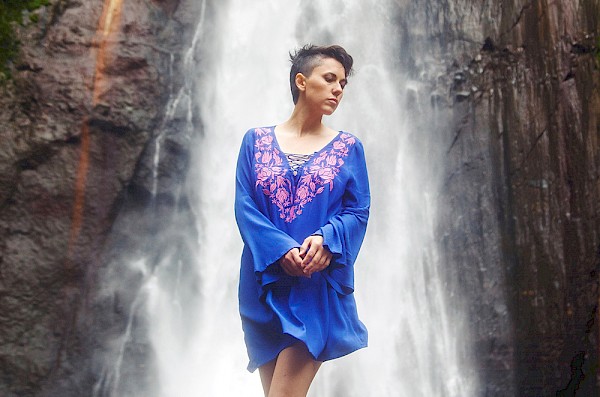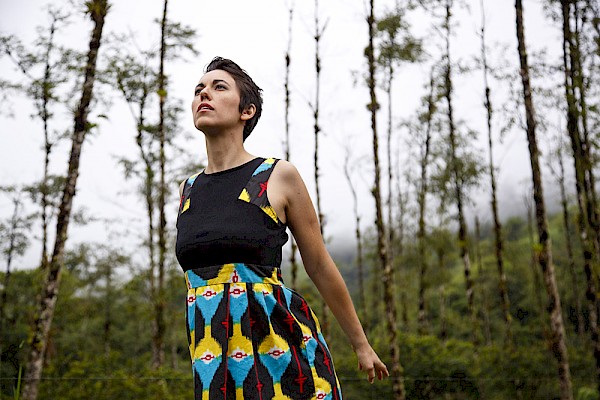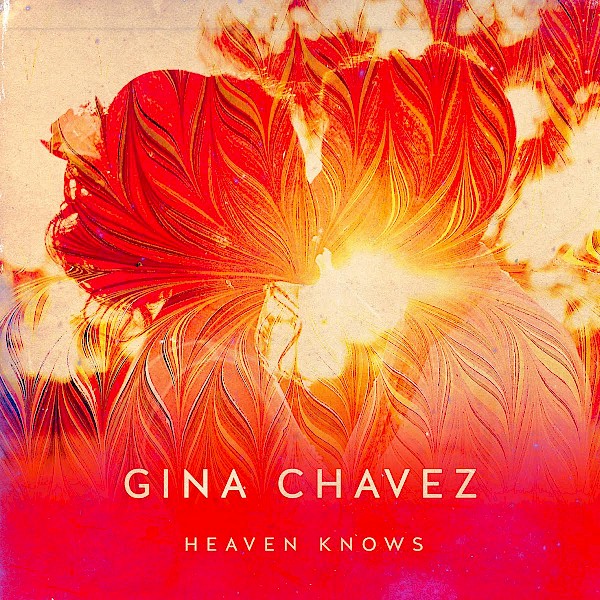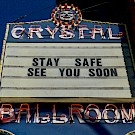 Photo by Spencer Selvidge
Photo by Spencer Selvidge
UPDATE:
Due to unforeseen circumstances Gina Chavez has had to postpone her performance at the Winningstad Theatre on October 26, 2018. Portland’5 Presents is planning on rescheduling the performance to a later date, yet to be determined.
Gina Chavez and Jodi Granado first met at a Catholic retreat while attending the University of Texas. For six months, they were just good friends. Gina was drawn to Jodi, but she hadn’t assumed it was anything romantic. Both had always dated men but neither had been in love. Then they kissed.
“In my head, I was thinking, ‘Okay, we’re gonna kiss, she’s gonna freak out, this will be the end of everything,'” says Chavez, who was raised in a staunchly Catholic household. “But in that moment, it was the most beautiful feeling of God I’ve ever experienced. Nothing in my life has felt more right. My first thought was, ‘This is the most incredibly pleasurable thing I’ve ever experienced.’ And then I thought, ‘If she doesn’t want this, then I don’t either.’”
Chavez mentions phenomenology—the idea that each human being experiences the divine in their own unique way. She adds, “After we kissed I was like, okay—if this is not God and what we’re meant to experience, then I don't know what is.”
Twelve years later, Gina and Jodi were married.
For a long time, their relationship remained a secret. Neither had “wanted” to be a lesbian, Chavez says, and everything they knew said this was “wrong”. Yet they couldn’t pull away from each other. “I didn’t realize I was a lesbian until we were neck deep in a relationship,” she says. “So I’m dealing with that aspect of ‘who am I?’ while falling head over heels in love with someone. It was really, really hard. But that’s what we went through to be where we are.”
And now, the world will hear their story.
Lightbeam, Chavez’s newest EP, is essentially a five-track love letter—an intensely personal reflection on their twelve-year journey. As she puts it, “Lightbeam is the story of our relationship—it’s us coming out of the darkness and into the light.” This current tour, says Chavez, is her chance “to shout this love from the rooftops.”
 Photo by Spencer SelvidgeChavez’s previous album, Up.Rooted, won Austin’s 2016 Album of the Year. Since then, she’s toured the world, appeared on NPR’s Tiny Desk Concert series, won 10 Austin music awards (including 2015 Austin Musician of the Year), and has played at SXSW for five straight years.
Photo by Spencer SelvidgeChavez’s previous album, Up.Rooted, won Austin’s 2016 Album of the Year. Since then, she’s toured the world, appeared on NPR’s Tiny Desk Concert series, won 10 Austin music awards (including 2015 Austin Musician of the Year), and has played at SXSW for five straight years.
Chavez will perform in Portland on Friday, October 26 at the Winningstad Theatre. Leading up to her show, Chavez spoke about her writing process and living with your heart.
What does love feel like?
If that first kiss taught me anything, it's that love is supposed to be this mutuality—that you’re both giving and receiving of each other. I think we often confuse pleasure with love. So the opposite of love is not hate—it’s use. Using someone to get what you want is the worst way to treat them. On the other hand, love and hate live right next door to each other.
In college, I fell in love with Jodi’s heart—I can see her beyond how she sees herself. And I draw from those moments when we struggle. Our marriage is not always sunshine and roses. But I remind myself of everything we’ve been through, and that she has my best interests at heart, and I have to choose love. That is a harder and often higher form of love.
I’ve really enjoyed 'Lightbeam.' You’ve said before, “This is the story my heart wanted to tell.” How did it feel to write in that way, as opposed to your songwriting in the past?
Lightbeam was not an intentional EP for me. I took some time off and just allowed myself to write, and what came out was what my heart was chewing on. I wasn’t trying to write in a particular style, I wasn’t trying to write in a particular language (since I do have bilingual music). Things came out this way and I just went with it.
Were you surprised by what came out?
Yes and no. With “Heaven Knows,” I created a groove on the guitar and the words that came were, "Heaven knows, heaven knows…" So then I’m thinking, "okay, what does Heaven know?" I followed that idea of “being the instrument instead of the creator,” of letting something speak through you. From that groove, the words just came.
As I’m telling you this, in the same breath I’m like, I’m the worst person at doing all this stuff. Literally, my day to day is the exact opposite of that.
 Artwork for "Heaven Knows," by Gary DorseyI can relate 100%. But this album does sound like it's from the heart, as opposed to the head. When you’re producing an album about love, how can music capture what words cannot?
Artwork for "Heaven Knows," by Gary DorseyI can relate 100%. But this album does sound like it's from the heart, as opposed to the head. When you’re producing an album about love, how can music capture what words cannot?
There’s something Berkeley professors call “prosody”—when melody matches a sentiment, or an emotion. When they’re perfectly coupled, that’s when magic happens. Like in the song, “You Are So Beautiful” (by Billy Preston)—it's one or two notes. But the way the melody moves those words makes it so gorgeous and powerful every time you listen.
With “Heaven Knows,” I just let music drive the words, and I feel those words match the rhythmic melody and sound emphasis so well. I feel the harmony of “It's Hard to Love a Woman” really captures the sentiment too.
One writer said of your shows, “I feel like she’s playing just for me.” You certainly bear your heart on stage. Is that a comfortable place for you?
That’s not the hard part for me. Bearing my heart and being myself is the easy part. The hard part is writing music. Being alone in a bedroom with a guitar is one of the most vulnerable places for me. I’m just alone with all the things I think about myself. I love being in front of people, I love being on stage. I’m the person who’s like, "Where the party at?!" But when I’m alone, I’m my own worst critic. It can be a dangerous place.
What gets you past that self critique?
Jodi is a huge help. She believes in me and can get me out of that bad headspace. But she can also be like, you need to get your shit together and finish this song.
But there’s also the idea that, not everything I write has to be amazing. Society has placed this burden on artists to be amazing all the time. I think a lot of us internalize that pressure when we put pen to paper. So as long as I exercise my songwriting muscle and get something out, it doesn’t have to be the final thing, it just feels really good to get it done.
Coming back to the heart—let’s say someone knows what the heart wants, but he or she is hesitant to follow. What would you say?
I don’t think we’re happy unless we’re listening to our heart. Especially these days, so much has been replaced by "right" and "wrong." But life is not about being right and wrong—it's about living in a way that’s loving. It's about meeting our neighbors where they’re at.
We’ve gotten so obsessed with right and wrong. When you know what? We’re not God. I don’t know what all the rights and wrongs are. And if you’re living your best life, and being a good person, and loving other people, then who am I to say otherwise?




